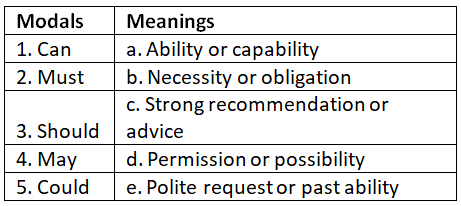Worksheet: Modals | English Grammar for Class 9 PDF Download
| Table of contents |

|
| Section A: Multiple Choice Questions |

|
| Section B: Short Questions |

|
| Section C: Fill in the Blanks |

|
| Section D: Match the Column |

|
| Section E: True or False |

|
Section A: Multiple Choice Questions
Q.1. Which of the following is a modal verb?
(a) Run
(b) Play
(c) Can
(d) See
Q.2. The modal verb 'may' is used to express:
(a) Ability
(b) Necessity
(c) Permission
(d) Obligation
Q.3. Which modal verb is used to express ability or capability?
(a) Might
(b) Shall
(c) Must
(d) Can
Q.4. Identify the modal verb in the following sentence:
"You should eat your vegetables."
(a) Should
(b) Eat
(c) Your
(d) Vegetables
Q.5. The modal verb 'could' is used to express:
(a) Ability in the past
(b) Obligation
(c) Permission
(d) Necessity
Section B: Short Questions
Q.1. What is the role of modal verbs in a sentence?
Q.2. Give an example of a sentence where 'must' is used to express obligation.
Q.3. How do we form negative sentences using modal verbs?
Q.4. What is the difference between 'can' and 'could'?
Q.5. Can modal verbs be used in the past tense? Explain with an example.
Section C: Fill in the Blanks
Q.1. Modals are a type of __________ verb that express a possibility, necessity, ability, or permission.
Q.2. We _________ go to the party if we finish our homework on time.
Q.3. She _________ speak French fluently.
Q.4. I _________ lend you my pen if you promise to return it.
Q.5. They _________ buy a new car next month.
Section D: Match the Column
Match the modals on the left with their corresponding meanings on the right.
Section E: True or False
Q.1. Modals are always used before the main verb in a sentence.
Q.2. "Can" is used to express a strong recommendation.
Q.3. "Should" is used to express possibility.
Q.4. "May" is used to seek permission or to express possibility.
Q.5. "Could" is used to express past ability or make a polite request.
You can access the solutions to this worksheet here.
|
26 videos|113 docs|41 tests
|
FAQs on Worksheet: Modals - English Grammar for Class 9
| 1. What are modals and why are they important in English grammar? |  |
| 2. Can you provide examples of common modals and their uses? |  |
| 3. How are modals used to form polite requests? |  |
| 4. What is the difference between "shall" and "will" in modal usage? |  |
| 5. Are there any exceptions or irregularities in the use of modals? |  |















